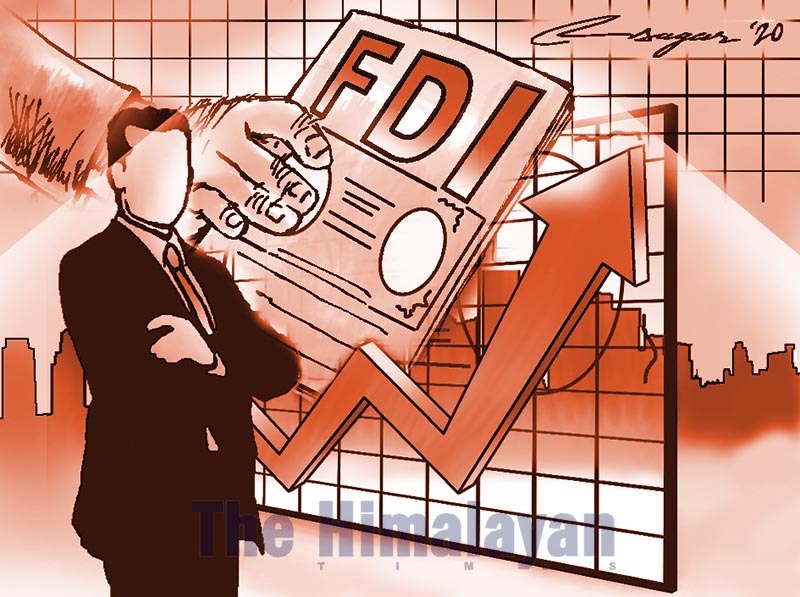Attracting FDI: Effective policy intervention needed
Focus should be accorded on attracting quality foreign direct investment and ensure that each dollar invested contributes, in one way or another, to sustainable development and inclusive growth of the country
Foreign direct investment (FDI) is not only about capital, but also about technology and know-how. It no longer moves from ‘North’ to ‘South’, but also from ‘South’ to ‘South’ and from ‘South’ to ‘North’. It has become part of the international production process through which investors establish a factory in one country to produce a good or a service that is part of a broader global value chain. It plays the instrumental role of satisfying the development, foreign exchange, investment and tax revenue gaps in developing countries.
FDI’s principal contribution to development is its unique productivity-enhancing effects, including a) improving export capacity and increasing imports of foreign-invested firms—both of which help domestic firms integrate into global production networks; b) inspiring technology transfer in production and management processes; c) enhancing training and skill development among workers; and d) bolstering competition and enterprise development.
But, it should be understood that while some factors that are vital in attracting FDI, including size of the market and availability of natural resources, cannot be induced by public policy, a number of other policy-related drivers—including human capital, the quality of infrastructure, and economic and political stability—can be influenced only in the medium to long run. In contrast, a number of components of a country’s investment climate—such as the quality of its laws and regulations and the efficiency of its bureaucracy—can be affected in the short term.
Nepal’s policymakers acknowledge that the benefits of FDI can be enormous, such as technology spillovers, augmentation of a competitive business environment, contribution to international trade and integration. In this respect, the country increased its efforts to improve the investment climate. As a result, according to the World Bank’s Doing Business 2020, Nepal climbed 16 spots and was ranked 94 out of 190 economies on the ease of doing business. Four vital reforms in a single year pertaining to construction permits, access to credit, trading across borders and contract enforcement helped the country reach this spot.
At the national level, legislation is in place that has incorporated a variety of guarantees and opportunities for foreign investors. FDI regulations have largely liberalised restrictions, provided for non-discrimination between foreign and domestic private investors, permitted profit repatriation, granted incentives and boosted the standards of treatment of foreign investors. The FDI Policy 2015 is a signal of the government’s increasing conviction to liberalise the economy. Though the government has been implementing a host of policy reforms to promote a competitive investment climate and generate a range of investment opportunities critical for the country in achieving its development goals, the reforms have not been successful.
A number of investors still maintain that investing in Nepal is difficult and risky due to corruption, bureaucracy and a weak regulatory environment. While Nepal’s legislation seems favourable, it still looks doubtful if the investment climate will be better once the legislation is implemented. Again, the country has not been able to pull on the potential technological and other contributions that FDI can make to the development process. This underscores the need and significance for effective policy interventions. The government had sought to entice foreign investors by holding a Nepal Investment Summit in 2017 and 2019. Still, FDI inflow has not improved. Despite political stability, the climate has not been accommodating for foreign investors.
The government and the private sector need to better understand how FDI helps in raising the country and firm’s competitiveness. For this, it is crucial that the government develop and implement a platform of policies aimed at enhancing competitiveness, restructure the industrial base, further strengthen the legal and regulatory frameworks that assist business, and support closer interface among the government, foreign investors, and the domestic business community.
Moreover, the government will also need to look at selective interventions to inspire innovative programmes with foreign investors, such as linkages with domestic firms, academic organisations and communities. For its role, the domestic private sector will have to formulate strategies to harness the technical and managerial capabilities of foreign firms, form more forward linkages with these firms, and detect techniques of increasing their competitive position.Again, focus should be accorded on attracting quality FDI and ensure that each dollar invested contributes, in one way or another, to sustainable development and inclusive growth. If managed effectively and without any vested interest, FDI can become a vital avenue of capital for investment in infrastructure and other development projects.
To conclude, FDI inflows can play a pivotal role in economic transformation through capital stock accumulation and technological spillover, and the improvement of employment conditions and infrastructure. Attracting more of it through effective policy intervention leads to higher productivity, which is the key to development.
Pant writes on globalisation and trade issues






